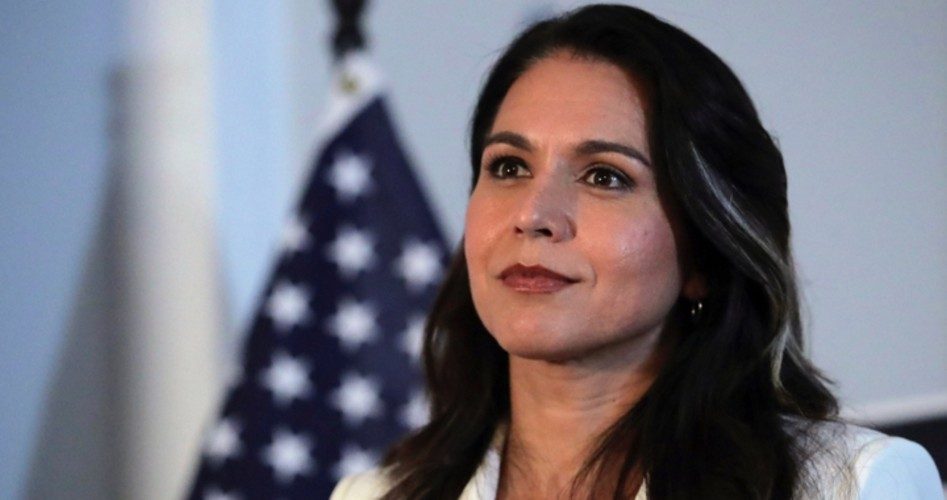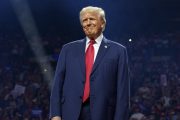
Congresswoman Tulsi Gabbard (D-Hawaii) announced Friday that she will no longer seek reelection to Congress next year so that she can concentrate all her energy on her campaign for the presidency.
Gabbard, a major in the Army National Guard who served two tours in the Middle East, has made a noninterventionist foreign policy the centerpiece of her campaign, and she continued to do so in her Friday announcement.
Noting that last year’s false alarm about a nuclear attack on Hawaii had “reawakened us all to the fact that our lives could end at any moment,” Gabbard said she was running for president to prevent such a catastrophe:
At this time when our country is so divided, and our world is moving ever closer to a nuclear holocaust; a time when we may be sucked into another even more disastrous war in the Middle East, and tensions with other nuclear powers are escalating, and with that, a new arms race and Cold War that can only end in nuclear catastrophe, I believe I can best serve the people of Hawaii and our country as your President and Commander-in-Chief.
Citing her military service and her experience on the House Foreign Affairs, Armed Services, and Homeland Security committees, Gabbard said, “I am prepared to walk into the Oval Office on Day 1 to do that job.”
“As President,” she continued, “I will immediately begin work to end the new Cold War and nuclear arms race, end our interventionist foreign policy of carrying out regime change wars, and redirect our precious resources towards serving the needs of the people here at home.”
Gabbard’s consistent anti-interventionist stance, the policy that most distinguishes her from the numerous other contenders for the Democratic Party’s presidential nomination, has led former Republican Congressman Ron Paul to declare her the “very, very best” of the Democrats currently in the race.
On the other hand, it has gotten her into hot water with the rest of her party, particularly its hawkish wing best exemplified by former Secretary of State Hillary “We came, we saw, he died” Clinton. Clinton and her allies in the media have recently charged Gabbard with being a Russian stooge because of her opposition to U.S. intervention in Syria. Gabbard responded by calling Clinton “the queen of warmongers, embodiment of corruption, and personification of the rot that has sickened the Democratic Party for so long.”
Gabbard’s now-single-minded focus on winning the presidency is, however, likely to fuel speculation that, as Clinton suggested, she is planning to mount a third-party bid — a move Democrats fear would split the liberal vote and reelect Republican President Donald Trump.
Considering Gabbard’s poor showing in polls of likely Democrat voters, she will need to put everything she has into her presidential campaign if she is to stand even the slightest chance of being the Democrats’ nominee.
In her statement, the congresswoman claimed to have made her decision based purely on principle and not on political considerations. “Throughout my life, the thought of a ‘political career’ never crossed my mind,” she said. “I’ve always done my best to serve where I felt I could make the most impact. It’s this principle of service above self that has motivated the decisions I’ve made throughout my life.”
But as Politico points out, there may be more to Gabbard’s calculations than simply doing the right thing:
Her path to winning a fifth term in 2020 was complicated by a formidable primary challenge from state Sen. Kai Kahele, as well as her thorny relationships with other Aloha State politicians.
A trio of former Hawaii governors have backed Kahele’s bid to unseat Gabbard, and she ignited a feud with Sen. Mazie Hirono after authoring an op-ed in January accusing Democrats on the Senate Judiciary Committee of “religious bigotry” in their questioning of a nominee for a district judgeship.
Regardless of Gabbard’s reasons for dropping out of her congressional race, her voice for peace and restraint in foreign affairs, already rare in Washington, will surely be missed — unless, of course, she wins the presidency. Then Americans must hope (against hope?) that she, unlike so many previous “pro-peace” politicians, doesn’t buckle under to the foreign-policy establishment.
Photo of Tulsi Gabbard: AP Images


